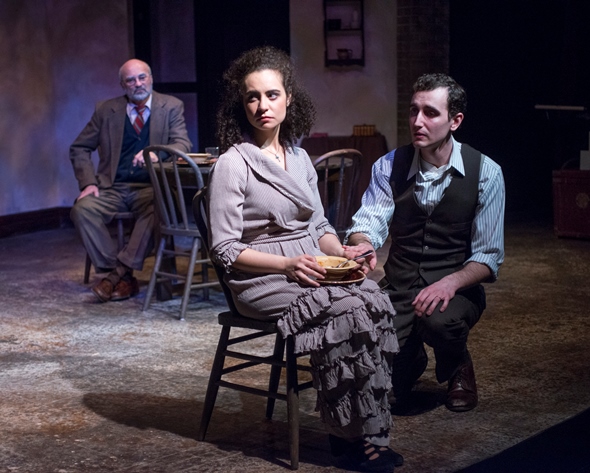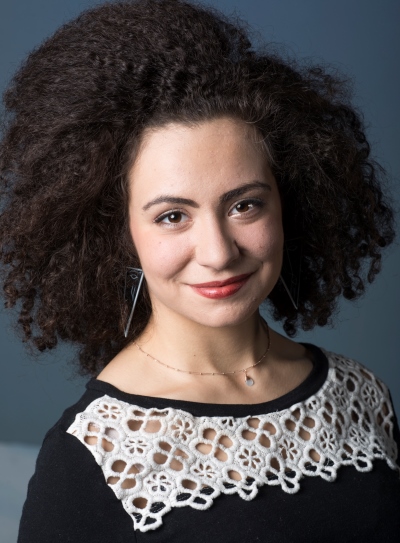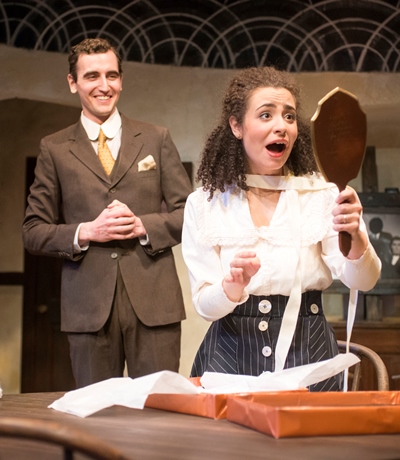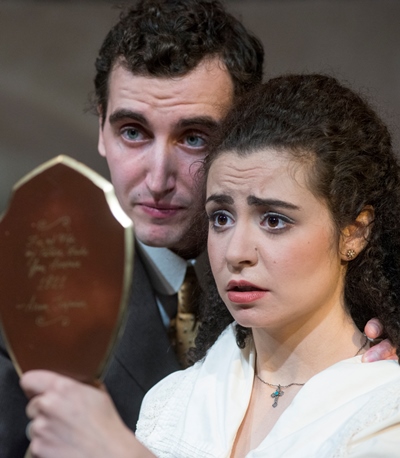Role Playing: Sophia Menendian reached back (but not far) as plucky Armenian refugee of 15
 Interview: Young actress says she tapped into the energy and openness of her own girlhood to portray the teen mail-order bride in Richard Kalinoski’s “Beast on the Moon” at Raven Theatre. Through June 6.
Interview: Young actress says she tapped into the energy and openness of her own girlhood to portray the teen mail-order bride in Richard Kalinoski’s “Beast on the Moon” at Raven Theatre. Through June 6.
By Lawrence B. Johnson
The most disarming, lovable character I’ve seen on a Chicago stage this season has to be 15-year-old Seta, refugee of the Armenian genocide and mail-order bride in Richard Kalinoski’s “Beast on the Moon,” played with big-eyed, open-hearted exuberance by Sophia Menendian, who’s all of 20. She says she captured Seta’s buoyancy by recalling her own unbridled spirit as an adolescent.  “Seta is wise beyond her years and happy just to be alive, but she also has a big streak of immaturity and an energy that reminds me of myself when I was like 12,” says Menendian, who’s about to enter her junior year of drama studies at the University of Illinois – Chicago. She’s also an ensemble member at Raven Theatre, where “Beast on the Moon” continues through June 6. “It’s a wonderful story, and the beautiful writing really helped me find Seta’s wisdom as well as her innocence.”
“Seta is wise beyond her years and happy just to be alive, but she also has a big streak of immaturity and an energy that reminds me of myself when I was like 12,” says Menendian, who’s about to enter her junior year of drama studies at the University of Illinois – Chicago. She’s also an ensemble member at Raven Theatre, where “Beast on the Moon” continues through June 6. “It’s a wonderful story, and the beautiful writing really helped me find Seta’s wisdom as well as her innocence.”
Kalinoski’s play unfolds in 1920s Milwaukee, in the aftermath of the Ottoman Empire’s bloody purge of Armenian Christians. Thirtyish Adam Tomasian (Matt Browning), also a refugee of the genocide, has found an apartment where he and his soon-to-arrive (and as yet unseen) bride will start a new life together. But the course of this affair is the furthest thing from smooth. He’s from a conservative family where men ruled and women were to speak only when spoken to; her parents were urban intellectuals who encouraged women to read, think and be heard. And that’s merely where the problems begin.
Tomasian, who saw his entire family massacred, is determined to carry on his father’s line. And so he immediately hustles Seta into reproduction mode. But her adolescent suffering has left her barren, and try, and try again, as they do, no pregnancy is forthcoming. As Tomasian sulks and turns silent, Seta tries to draw him out, but to no avail. Act II fast-forwards 12 years. The burbling girl has become a woman; the marriage has endured – and now a child does enter the picture, not theirs but more like a foundling, a young streetwise orphan (Aaron Lamm), whom Seta takes under her wing. Unbeknownst to Tomasian.
 Menendian faced a double challenge: to be convincing as a young girl and then to reappear as a settled, mature women, the well-established mistress of her household.
Menendian faced a double challenge: to be convincing as a young girl and then to reappear as a settled, mature women, the well-established mistress of her household.
“I began with physicality,” she says. “I wanted to connect with how a 15-year-old would walk, how open her eyes are, her mannerisms. In the second act, Seta is more composed, she walks with more grace, her voice is more mature, she’s more tactical in dealing with Tomasian.”
Making the early confrontations between Seta and Tomasian as credibly painful as they are often funny, she says, tapped into the good rapport between the two actors – and drew heavily on Menendian’s confidence in the director, Michael Menendian, her father, Raven’s co-founder and producing artistic director.
“Matt and I agreed this would be very difficult if we didn’t get along so well,” she says. “Matt is a good actor and we have a good friendship. We didn’t know each other before the first day of rehearsal. But now we hang out together and talk about the play. To be able to flesh out such an intricate and complicated piece of work has been amazing.”
The crisis between Seta and Tomasian reaches a breaking point toward the end of the first act. She has not conceived and he is angry. But it’s more than that. He’s desperate to preserve his father line, much as he has preserved the only other thing of his father’s – a large overcoat that hid the boy when the Turks came to his home and killed the rest of his family.
 “Adam doesn’t talk about it,” says Menendian, whose heritage is Armenian. “It’s common for Armenians who survived not to talk about it. But Seta does talk about it. She understands that if she keeps it inside her, it will fester and eat her alive. She can’t stop talking. Her name in Armenian means talkative.”
“Adam doesn’t talk about it,” says Menendian, whose heritage is Armenian. “It’s common for Armenians who survived not to talk about it. But Seta does talk about it. She understands that if she keeps it inside her, it will fester and eat her alive. She can’t stop talking. Her name in Armenian means talkative.”
The awfulness that has taken root in Tomasian’s heart is literally framed in a photo of his family that he has kept. But the figures in the image have no heads. He has removed them all. In the place of his mother and father, he has pasted head shots of himself and Seta. Tomasian gives this large, macabre photograph a prominent place in their home, and Seta must live with it and look at it daily.
“We didn’t have the actual photo until the final dress rehearsal,” says Menendian. “We’d been working with a framed blank paper. But when that picture of headless people was put into the frame, everything changed for me. I could feel the weight of it. It completely changed the way I delivered my lines. I’d been much lighter and then, ‘Oh, my God, why are these heads gone?’
“It was an eerie thing. I can’t imagine staring at that day in and day out and knowing that because of you, they’re not being filled.”
 As for the young actress taking close guidance from Dad, Sophia Menendian said she was not only open to Michael’s insight, she counted on it.
As for the young actress taking close guidance from Dad, Sophia Menendian said she was not only open to Michael’s insight, she counted on it.
“Mike is my father. I knew I was covered. I trust him entirely,” she says. “I trust his eyes. I saw in them the nuance we couldn’t always feel. I would understand the general idea, then he would be able, moment to moment, to get me from 1 to 1 ½. He’s very good with details.
“And he was really good at helping us not play the end at the beginning. It’s easy, as an actor, to forget what you don’t know (yet). Mike’s pacing really helped to make everything stew and steep until the pot boils over.”
The actress also got some good counsel directly from the horse’s mouth: She had dinner with the playwright, who admitted he simply didn’t know the answer to some pretty big questions. “We know that Tomasian saw his family killed, and that Seta saw her older sister raped,” says Menendian. “But how much more, if anything, did she actually see when her family was killed?
“I asked Kalinoski that question among others. Sometimes he would just say, ‘I don’t really know.’ But he also made a good general point: He said not everything needed a concrete answer. What’s important is that these issues are in the background, even if the specifics are unknowable.”
Related Link:
- Review of ‘Beast on the Moon’: Read it at ChicagoOntheAisle.com
More Role Playing Interviews:
- Lindsey Gavel’s distressed Masha, in ‘Three Sisters,’ began with a touch of cheer
- Hollis Resnik felt personal bond with zealous, skeptical scholar in ‘Good Book’
- A.C. Smith is ready undertaker, lord of diner world in ‘Two Trains Running’
- Lia D. Mortensen’s intense portrait of a mentally failing scientist holds mirror to life
- Siobhan Redmond sees re-formed Lady Macbeth as valiant queen in ‘Dunsinane’
- Eileen Niccolai harnessed a storm of emotions to create spark in Williams’ Serafina
- Steve Haggard, aiming at reality, strikes raw core of grieving man in ‘Martyr’
- Shannon Cochran found partners aplenty in sardonic, twice-told ‘Dance of Death’
- Natalie West scaled back comedy to nail laughs, touch hearts in ‘Mud Blue Sky’
- Dave Belden, actor and violinist, adjusted pitch for ‘Charles Ives Take Me Home’
- Joseph Wiens starts at full throttle to convey alienation of ‘Look Back in Anger’
- Shane Kenyon touches charm and hurt of lovable loser in Steep’s ‘If There Is’
- Ramón Camín sees working class values in Arthur Miller’s tragic Eddie Carbone
- Hillary Marren’s charming, rapping witch in ‘Woods’ shapred by hard work, free play
- Mary Beth Fisher embraces both hope, despair of social worker in ‘Luna Gale’
- Brad Armacost switched brothers to do blind, boozy character in ‘The Seafarer’
- Karen Woditsch shapes vowels, flings arms to perfect portrait of Julia Child
- Ora Jones had to find her way into Katherine’s frayed world in ‘Henry VIII’
- Kareem Bandealy tapped roots, hit books for form warlord in ‘Blood and Gifts’
- Eva Barr explored two personas of Alzheimer’s victim to find center of ‘Alice’
- Darrell W. Cox sees theater’s core in closed-off teacher of ‘Burning Boy’
- Chaon Cross turned Court stage into a romper room finding answers in ‘Proof’
- Dion Johnstone turned outsider Antony to bloody purpose in ‘Julius Caesar’
- Noir films gave Justine Turner model for shadowy dame in ‘Dreadful Night’
- Anish Jethmalani plumbs agony of good man battling demons in ‘Bengal Tiger’
- Gary Perez channels his Harlem youth as quiet, unflinching Julio in ‘The Hat’
- Kamal Angelo Bolden sharpened dramatic combinations to play ‘The Opponent’
- In wheelchair, Jacqueline Grandt explores paralysis of neglect in ‘Broken Glass’
- James Ridge thrives in cold skin of Shakespeare’s smiling serpent, Richard III
- Stephen Ouimette brews an Irish tippler with a glassful of illusions in ‘Iceman’
- Ian Barford revels in the wiliness of an ambivalent rebel in Doctorow’s ‘March’
- Chuck Spencer flashes a badge of moral courage in Arthur Miller’s ‘The Price’
- Rebecca Finnegan finds lyrical heart of a lonely woman in ‘A Catered Affair’
- Bill Norris pulled the seedy bum in ‘The Caretaker” from a place within himself
- Diane D’Aquila creates a twice regal portrait as lover and monarch in ‘Elizabeth Rex’
- Dean Evans, in clown costume, enters the darkness of ‘Burning Bluebeard’
- Dan Waller wields a personal brush as uneasy genius of ‘Pitmen Painters’
- City boy Michael Stegall ropes wild cowboy in Raven Theatre’s ‘Bus Stop‘
- Brent Barrett is glad he joined ‘Follies’ as that womanizing, empty cad Ben
- Sadieh Rifai zips among seven characters in one-woman “Amish Project”
- Kirsten Fitzgerald inhabits sorrow, surfs the laughs in ‘Clybourne Park’
- Janet Ulrich Brooks portrays a Russian arms negotiator in ‘A Walk in the Woods’
Tags: Aaron Lamm, Matt Browning, Michael Menendian, Raven Theatre, Richard Kalinoski, Sophia Menendian

